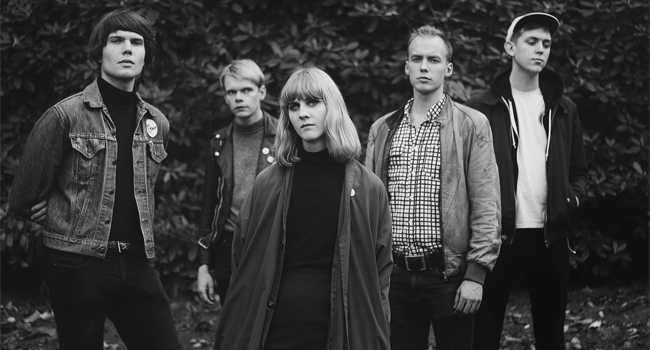 Hawley Shoffner tends to the turntable like a potter to her wheel. If a record stops or needs turning—even while she’s in mid thought—she rises without a word, lifts the needle and flips through encyclopedic crates of vinyl for the next, most suitable sounds. When I arrive, it’s Springsteen’s Nebraska on rotation, but we run a gamut of genres throughout the chat.
Hawley Shoffner tends to the turntable like a potter to her wheel. If a record stops or needs turning—even while she’s in mid thought—she rises without a word, lifts the needle and flips through encyclopedic crates of vinyl for the next, most suitable sounds. When I arrive, it’s Springsteen’s Nebraska on rotation, but we run a gamut of genres throughout the chat.
Shoffner’s Logan Square apartment is a provincial cabin—wooden and warm. An army munitions crate, an ostrich skull, and a stuffed tiger count among the pieces of decor. She has a taste for black-and-white Hollywood movies and pulls out a Spencer Tracy promotional poster for Northwest Passage—though her favorite is The Philadelphia Story. “Jimmy Stewart is so perfect in that. The first time I had drunk hiccups I was so happy to sound like him,” she says.
There are two wall-height shelves on either end of her mantle stuffed to the brim with movies, ephemera and books. While no stranger to historical biographies, her current obsession is comics, and she’s spent the past few weeks barreling through a signed copy of Chris Ware’s Building Stories. In person, she’s kind but quiet and won’t speak to fill silence.
The young Shoffner was raised in Wichita, a town known for its post-rock aesthetic. She played in a series of bands, including a math rock outfit, before making the move to a solo career. In 2008, at the age of 21, she won the Farmer’s Ball, Wichita’s citywide songwriting competition. It was her third live show. She attended school at the University of Kansas in Lawrence, thriving in its music scene and meeting many of her future touring mates. Hawley worked in a series of coffe shops, antique and record stores. Between lectures on the Civil War and the Black Panther Movement, she scribbled lyrics in her notebook. Hawley always starts with the lyrics.
“I never force myself to write,” she says, which is a surprise given how prolific she’s proven to be.
In 2010, Shoffner made the move from Kansas to Chicago with bandmates Alex and Austin Ward and entered months of unemployed turmoil, much of which can be heard in bottled form on her debut Hawley, she took a job at local startup, Groupon.
Talking muses, Shoffner lists ‘Judy-Judy-Judy’ Garland as quickly as St. Vincent, espousing Annie Clark’s theory of “writing Disney scores” as a choice approach to craft. Though “obsessed” with the latter, she doesn’t seek imitation:
“You can tell (St. Vincent’s) in agony,” Shoffner says. “She’ll crowd surf and you can tell she’s been debating that crowd surf for like a month. She doesn’t want to do it, you think. I love her but every time I see her I feel uncomfortable.”
It’s the same kind of strain she’s been at odds with in her own music. The choice to consciously “perform,” a decision that is untraceable in great artists, is the constant struggle of a budding musician. When she first began on piano, she imitated Björk’s vocal stylings, until growing into something all her own. Now, though she denies it, she sings in a twangy lilt, neither Southern nor a lisp, but endearing just the same. With her forthcoming album, Shoffner’s shifted from Indie Pop to what she’s aptly calling Folk Grunge—a far cry from her self-titled debut.
“[Hawley], for me, is so far away,” she says, claiming that while she’s the same person who wrote the album, she now feels more confident writing songs.
Hawley is a collection of jarringly honest bedroom pop, replete with kazoo and ukelele and themes ranging from infidelity, to anxiety, to loneliness.
Though you wouldn’t guess from her affability, nerves are Shoffner’s longtime nemesis. “Every time I’m about to play a show, I feel like I’m going to throw up,” she says. Oftentimes, it’s more than a feeling. And if it makes sense that someone so introverted would be traumatized by the stage, recording is just as much, if not more, of a struggle. She took out a loan to press her forthcoming record, leaving work early some days to make studio sessions.
If she could be said to have one, Shoffner’s “Judas!” moment came when she put down the ukelele and picked up the electric guitar, a move that’s microcosmic of her musical development. “If you think piano is a box,” she says of the moment the audience passes judgement on a performer, even before a note is struck, “Ukelele is a box. It’s the smallest possible box.”
Despite her relative newness to six-strings, she’s insisted on keeping the power-trio format. “The guitar, sometimes, is scary,” she admits—troubled by venues too dark to discern fret markings, feedback, juggling multiple pedals, keeping calluses and of course, the natural terror of the sound check. Though, as her new recordings prove, she’s no longer a novice.
“I don’t dislike [improvisation] by other people, or after two beers. I could warm up to the idea. But when people say the word ‘jam,’ I want to kill myself,” Shoffner says.
It could be expected for a performer so deliberate to come off as a coldly calculating auteur, but Hawley’s cool and entrancing presence on the stage totally belies it.
“I don’t see the point in worrying,” she says. One of the most surprising things about Hawley, rare among those of her generation, is a genuine filial devotion. In fact, she claims her greatest fear in life is upsetting her parents, for whom she has a longstanding love. Her favorite song from Hawley—an album she claims to have written for her mom—is a bouncy ballad “Suzannah,” about a girl who “hides her eyes” and “reads out loud because she likes the sound” a song “she had to write for herself”—but it’s also the story of her mother, who wanted to be a musician but was too crippled by anxiety to pursue that life.
Between the howling guitar lines and railing drums of her new compositions, it’s impossible to miss the bold new course which Hawley is on, one that—as ever—doesn’t look back. The same forces brought her out of Kansas, away from the instruments she first learned to play, and distanced her from the ones she loves most. It’s easy to dismiss a move like this as novelty, taken by a confused artist with unsure footing, and write it off before it’s even released. However, with a lifetime of passion at her back and a wild spirit at heart, Shoffner has created an enchanting sound with a beautiful new voice.




